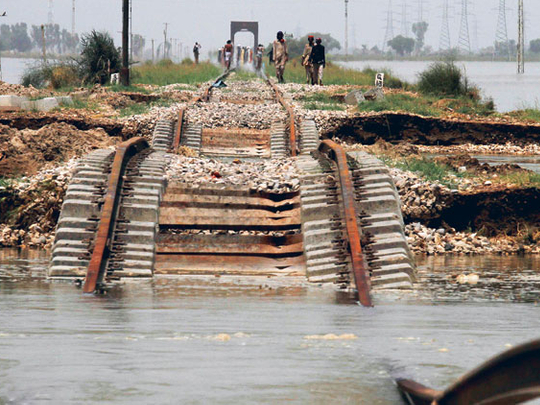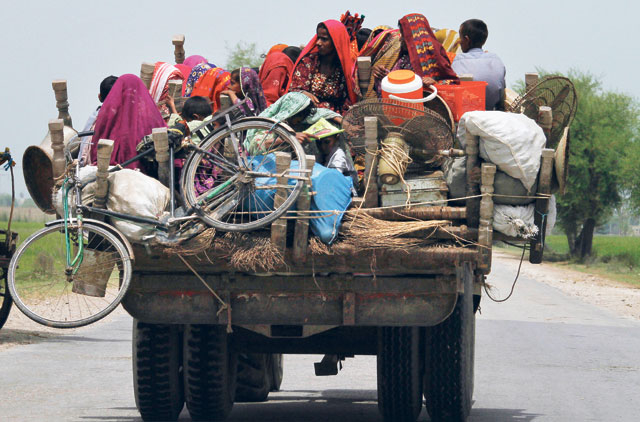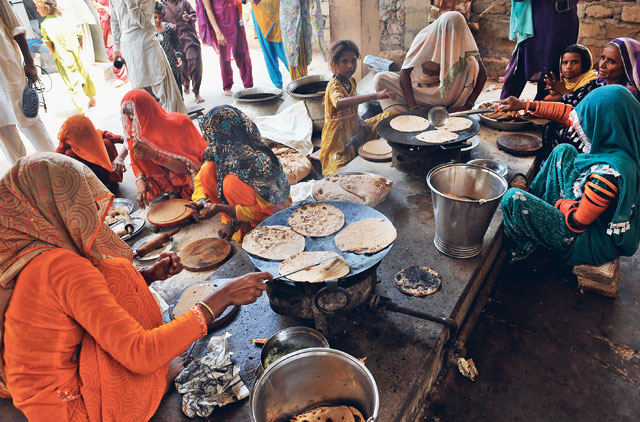
Thatta, Pakistan: Hundreds of thousands of people were fleeing areas of southern Pakistan yesterday as rising floodwaters breached more defences and inundated towns.
For nearly a month torrential monsoon rains have triggered massive floods, moving steadily from north to south in Pakistan, affecting a fifth of the volatile country and 17 million of its 167 million people.
Southern Sindh is the worst-affected province. Out of its 23 districts, 19 have so far been ravaged by floods, a statement by the United Nations' Office for the Coordination of Humanitarian Affairs (OCHA) said on Friday.
"More than seven million people have been displaced in Sindh since August 3, one million only in the past two days," provincial relief commissioner Gulam Ali Pasha said.
"The magnitude of this catastrophe is so huge that the government cannot cope with it alone. We are trying to grapple it, but we need international support," he said.
Pasha said 2.3 million people were still in need of tents and food.
"We are fighting to save Thatta and other towns," in Sindh, he added.
Other officials said floods were moving swiftly towards Thatta district and had begun submerging the district's outskirts.
"Two more breaches have taken place around Thatta. We are trying to save the city, [but] Belo has been submerged in water," Hadi Bakhsh Kalhoro, a senior administrative official, said.
Belo, on the outskirts of Thatta, has a population of around 10,000 people.
Thatta was deserted as people fled with their livestock and other belongings, heading for nearby Makli and Karachi as engineers tried to repair a six-metre wide breach in a nearby dyke, a reporter said.
"The flood situation in southern Sindh continues to deteriorate, large-scale population movements have been reported following the breach of an embankment in Thatta district," an OCHA statement issued late on Friday said.
"The Indus River is raging at 40 times its normal volume, with the largest sea surge of water now in the Thatta district," it said.
Sindh irrigation minister Jam Saifullah Dharejo said they were making all possible efforts to save Thatta district.
"Today is very important for Thatta, we are using all our resources to stop the water flow towards Thatta. We are making gigantic efforts," he told reporters.
Sindh chief minister Syed Qaim Ali Shah warned the city would be in danger until the breach was repaired.
"We are hopeful that we will successfully plug the breach in two to three days, but the danger to Thatta remains," he told reporters.
Pakistan is planning to soon host an international donors' conference to help the flood victims, foreign ministry spokesman Abdul Basit said yesterday.
United Nations officials said humanitarian workers were increasingly worried about malnutrition and disease among children.
"We must act together to ensure that already malnourished children do not succumb to disease, and to prevent more from becoming malnourished and ill," said Martin Mogwanja, UN humanitarian coordinator in Pakistan.
"We are responding to this threat and must continue to do so. If nothing is done, an estimated 72,000 children, currently affected by severe acute malnutrition in the flood-affected areas, are at high risk of death," he said.
The UN Children's Fund echoed those fears.
‘Contaminated water'
"The flooding has surrounded millions of children with contaminated water. Most have nothing else to drink.
"We fear the deadly synergy of waterborne diseases, including diarrhoea, dehydration, and malnutrition," said deputy Unicef representative Karen Allen.
Pakistan's worst humanitarian disaster has left eight million dependent on aid for their survival and has washed away huge swathes of the rich farmland on which the country's struggling economy depends.
The government has confirmed 1,600 people dead and 2,366 injured, but officials warn that millions are at risk from food shortages and disease.














